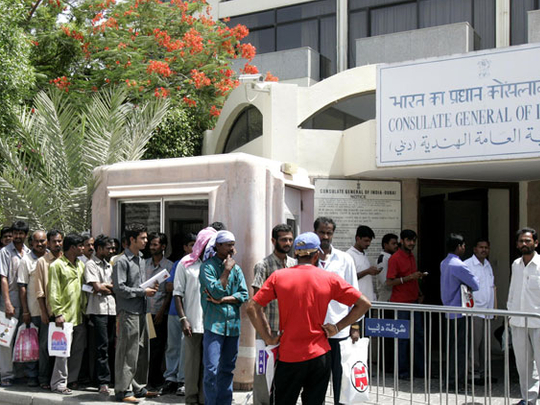
Abu Dhabi: The Government of India will soon open a centre in Dubai to enrol thousands of Indian expatriate workers in its ambitious Pension and Life Insurance Fund (PLIF).
The voluntary scheme offering three important benefits will help the skilled and unskilled workers to save money for their old age, to have financial means when they go back home and a life insurance cover for Rupee 100,000 (Dh6,500) during their work abroad.
About 65 per cent of more than two million Indians in the UAE are blue collar workers and they will get an early opportunity to enrol in the scheme.
Workers between the age of 18 and 50 who hold a Emigration Clearance Required (ECR) passports are eligible to enrol in the scheme. India issues ECR passports to those who have not passed matriculation (Grade 10).
The enrolment centre to be opened in the UAE will be the first overseas centre for the purpose, said the Ministry of Overseas Indian Affairs (MOIA) which introduced the scheme, in a statement issued to Gulf News yesterday. The ministry has already opened two enrolment centre in Kerala in India.
The Indian Embassy is considering Dubai to set up the enrolment centre for the scheme because of the presence of large number of Indian workers in Dubai and northern emirates, Indian Ambassador to the UAE told Gulf News on Tuesday.
“We are thinking of operating the centre as part of the already functioning Indian Workers Resource Centre (IWRC), a support centre for workers,” M.K Lokesh said.
Indian Government will provide a contribution of up to Rs2,000 (Dh130) per year for male workers and Rs3,000 (Dh195) per year to women workers for up to either five years or until the worker returns home, whichever is earlier. The proposed contribution shall flow to the individual PLIF account of each eligible subscriber.
The workers have to contribute between Rs1,000 (Dh65) and Rs12,000 (Dh780) per annum towards pension fund and Rs4,000 (Dh260) towards return and resettlement fund. They will derive corresponding benefits when they go back home and during their old age.
It is observed that a majority of the earnings periodically remitted by the overseas Indian workers to their families in India are rarely accumulated as savings and often cause only a temporary improvement in the lifestyle of their families, said Vayalar Ravi, Indian Overseas Affairs Minister. As a result, a majority of overseas Indian workers face the risk of poverty when they return to India and when they are too old to work, he said.








